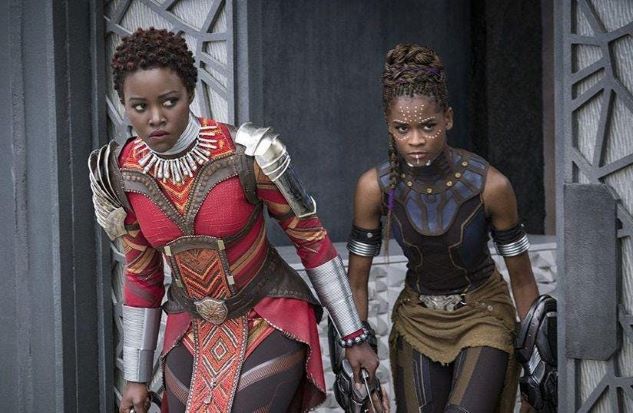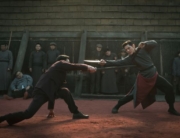Black Panther: Wakanda Forever wastes no time addressing the heart-wrenching elephant in the room. Within its first minutes, we’re made to witness King T’Challa’s off-screen passing and the raw heartbreak of his funeral, imitating the anguish millions felt after hearing about Chadwick Boseman’s death in 2020. Any Black Panther sequel was going to be hard. Rewriting one to compensate for the loss of the main protagonist and its equally beloved actor felt seemingly impossible.
By some miracle, Wakanda Forever works on both counts. This ambitious sequel from returning director Ryan Coogler channels the fallout of Boseman’s death into a meaningful, almost meta, reflection of the post-Phase Three Marvel Cinematic Universe. It’s a film about grief and how people cope with the loss of their loved one—some better than others—to improve the world, an emotional tether that binds the story, even as it stretches itself too thin.
Set one year after T’Challa’s death, tensions run high for Wakanda since the late king ended his nation’s isolationist policies. The reinstated Queen Ramonda (Angela Bassett) must push back against First World parties who barely hide their geopolitical interest in claiming the rare, powerful mineral vibranium by trade or force, often without success against superior Wakandan forces. Okoye (Danai Gurira) and her Dora Milaje guard still work covert operations on the Afrofuturistic government’s behalf, Nakia (Lupita Nyong’o) has found new purpose in Haiti, while M’Baku (Winston Duke) has become an ally to the crown. However, Princess Shuri (Letitia Wright), conversely, struggles to move on. Lost in her research, Shuri devotes countless days to modernizing Wakanda’s defenses, as if to disprove the idea that the Black Panther is still needed in modern times. Though subconsciously, her rage feels directed inward, at Shuri’s failure to save T’Challa.
But after the United States locates a vibranium supply below the sea bed, the discovery sets off a chain reaction of events between Wakanda and the underwater Mesopotamian–inspired city of Talokan. Fearing humanity’s course of action from past experiences, Talokan’s leader, Namor (Tenoch Huerta), wishes to skip negotiations and take his fight straight to all nations of the surface world, but not before consulting Wakanda about a potential alliance. Or, at the very least, not stand against his mission to eliminate the creator of a vibranium-seeking device: a MIT student, Riri Williams (Dominique Thorne), who, ironically, has no clue what her invention is being used for. Wakanda, of course, will not abide Namor’s request, but upon finding itself on the brink of war with Talokan, the question soon becomes, what are they willing to sacrifice for peace?
The upside to Wakanda Forever’s nearly three-hour duration is that it feels earned. With a sprawling roster of location and set pieces, Wakanda Forever goes big and hits hard whenever the chance to flex its sci-fi/futurism drama and world-building skills arises. Such is the case with Shuri’s olive branch-turned-antagonism with Namor, but also her friendship with Riri, who mirrors Shuri’s love of building and innovating new technology.
The standout character is indubitably Namor, with Huerta giving the elder, winged-foot Marvel character an intensity that commands respect and even some fear whenever he rises from the water. Like all great villains, Namor believes himself a hero whose actions, however violent, are indications of the lengths he’ll go to ensure Talokan remains free of harm. It’s only when Namor takes the fight to Wakanda for standing against him that we see just how destructive the original Marvel antihero can be, a trait he and Black Panther’s original villain Killmonger have in common.
But making a story too sprawling has its detriments. By juggling so many characters, Wakanda Forever can’t give every old or new face the attention they deserve. Bringing Agent Everett Ross (Martin Freeman) back, for example, doesn’t add much to the A-plot. Same goes for newcomer Aneka (Michaela Cole) or even Okoye herself, whose arc takes a dramatic turn in the first act but is forced to recede into the background until she’s later brought back. It’s a double-edged sword. Each member of Black Panther’s original cast stood out for their distinct personalities. Despite upgrading half of that cast to lead roles, Wakanda Forever lacks the room for everyone’s story.
Like Spider-Man: No Way Home, Black Panther: Wakanda Forever fancies itself a meditative adventure hiding unexpected cards up its sleeve. Everything from the midway point onward carries this movie into darker territory than anticipated, with shocking reveals and character decisions—especially those made by Shuri—that leave you guessing how it will all resolve. The story lives in the shadow of T’Challa, one of Marvel’s most noble characters, and no one here tries to replace him, or Chadwick Boseman. All the filmmakers can do is honor his legacy, and Wakanda Forever honors him about as well as it can.







Leave A Comment